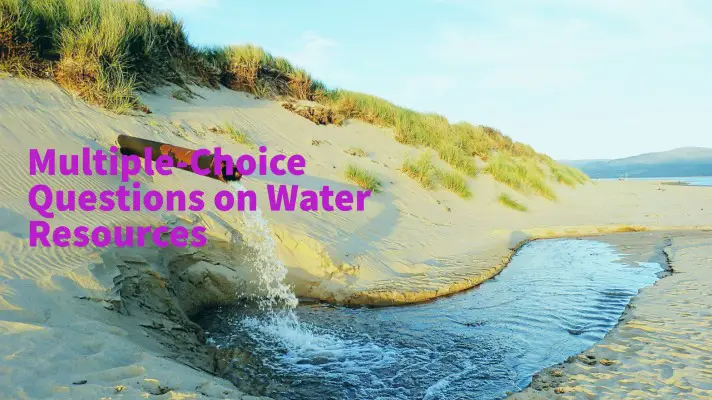Hello Readers! I hope that all of you are doing fine. I am here with a lot of Multiple-Choice Questions on Water Resources. While going through the Objective-type questions on Water Resources, you will come across some Amazing Facts on Water Resources and these are quite interesting. Let’s enjoy by gaining more knowledge!
Further for getting the PDF version of this MCQ sheet in hand, click on the PDF downloadable button that you will get at the end of this article.

Multiple-Choice Questions on Water Resources For Class 3
Here are some MCQ questions on Water Resources:
- When a solid is converted into a liquid, it is known as:
- Melting
- Freezing
- Evaporation
- Condensation
Ans: (1)
- Which one of the following is true in the case of Melting?
- Heat is removed
- Heat is added
- Addition or removal of heat is not required
- None of these
Ans: (2)
- Which one of the following is true in the case of Freezing?
- Heat is removed
- Heat is added
- Addition or removal of heat is not required
- None of these
Ans: (1)
- When a liquid is converted into a solid, it is known as:
- Melting
- Freezing
- Evaporation
- Condensation
Ans: (2)
- When a liquid is converted into vapor, it is known as:
- Melting
- Freezing
- Evaporation
- Condensation
Ans: (3)
- When the vapor is converted into a liquid, it is known as:
- Melting
- Freezing
- Evaporation
- Condensation
Ans: (4)
- Which of the following state of water contains more heat?
- Ice
- Water
- Vapour
- Steam
Ans: (4)
- The reverse process of melting is known as
- Condensation
- Evaporation
- Freezing
- None of these
Ans: (3)
- The reverse process of Condensation is known as
- Melting
- Freezing
- Evaporation
- None of these
Ans: (3)
- The water droplets combine with tiny dust particles in the air to form __.
- Rains
- Fogs
- Clouds
- None of these
Ans: (3)
- __is the purest form of natural water.
- River water
- Water stored in dam
- Sea water
- Rain
Ans: (4)
- Which liquid is known as Universal Solvent?
- Oil
- Honey
- Water
- Milk
Ans: (3)
- Which of the following are soluble impurities?
- Soaps
- Dirt
- Oil
- Clay
Ans: (1)
- Which of the following are insoluble impurities?
- Soaps
- Detergents
- Oil
- None of the above
Ans: (3)
- Potable water is __.
- Rain water
- Pond water
- Sea water
- Pure water that is fit for drinking
Ans: (4)
- In the villages, people used to fold a clean cloth __ times to form __ layers to purify water.
- 8, 3
- 3,8
- 2,5
- 5,2
Ans: (2)
- The water treatment plant is used to:
- To purify the water
- To treat the water
- Both (1) and (2)
- To carry the water from one place to another place
Ans: (3)
- Which of the following element is added with water to purify it?
- Hydrogen
- Chlorine
- Carbon
- Nitrogen
Ans: (2)
- The method of collecting and storing rain-water for future use is known as
- Water treatment
- Chlorination
- Rainwater harvesting
- None of these
Ans: (3)
- Falling of water on Earth in the form of rain is termed as:
- Condensation
- Rain water harvesting
- Chlorination
- Precipitation
Ans: (4)
10 Amazing Facts on Water
- How much percentage of Earth water is fresh?
- 3
- 30
- 6
- 60
Ans: (1)
- How much fresh water is trapped within glaciers?
- 6%
- 8%
- 68%
- 86%
Ans: (3)
- Which one is true?
- Hot water freezes faster than that of cold water
- Cold water freezes faster than that of hot water
Ans: (1)
- Water regulates the __.
- Earth’s pressure
- Earth’s temperature
- Gravitational pull
- The purity of air
Ans: (2)
- How much water should we drink daily?
- 500ml
- 5000ml
- 200 ml
- 2000ml
Ans: (4)
- Cucumber has __% of water inside it.
- 5
- 9
- 95
- 59
Ans: (3)
- Which one is true?
- Ice is lighter than water
- Ice is heavier than water
Ans: (1)
- Which one is true?
- Ice sinks in water
- Ice floats in water
Ans: (2)
- When water freezes and is converted into ice-
- It contracts
- It expands
- It remains same
Ans: (2)
- How much water is there in our brain?
- 5%
- 7%
- 57%
- 75%
Ans: (4)
Quiz on Water Resources
Here is the Quiz for you:
I hope that you have enjoyed the quiz.
Water Resources Worksheet
Fill in the blanks: (1×10=10)
- A solid can be converted into liquid by __.
- Very hot water vapour is called __.
- When vapour is converted into liquid, it is called __.
- Pure water that we drink is called __.
- Cholera,Jaundice, etc are the diseases caused by drinking __ water.
- __ is a universal solvent.
- Mud is an example of __ impurities.
- In swimming pools, for killing the germs of water, __ is used.
- Rain water harvesting is the method of __ water.
- Clouds composed of water droplets, air, and __ particles.
Give a scientific reason for the following facts.(3×4=12)
- Clothes dry more quickly in Winter than Monsoon.
- When we come out from an Air-condioned car, we see water droplets in our spectacles.
- Underground water is actually rain water
- The hot food on a plate becomes cool more quickly than the food kept in a bowl.
State True or False (1×8=8)
- The clothes become dry more quickly in monsoon.
- The hot soup will be cool if you put it in a glass in stead of putting it in a bowl.
- Very hot steam is known as Water vapour.
- Mud is a soluble impurities.
- Soap is a soluble impurities.
- Polluted water is known as portable water.
- Freezing means converting a liquid into a solid.
- Boiling temperature of water is 1000C.
Conclusion
I hope that you all have enjoyed the article on Multiple-Choice Questions on Water Resources. This will surely help you in achieving a high score in your school examination / competitive examination. Wish you all the best!


